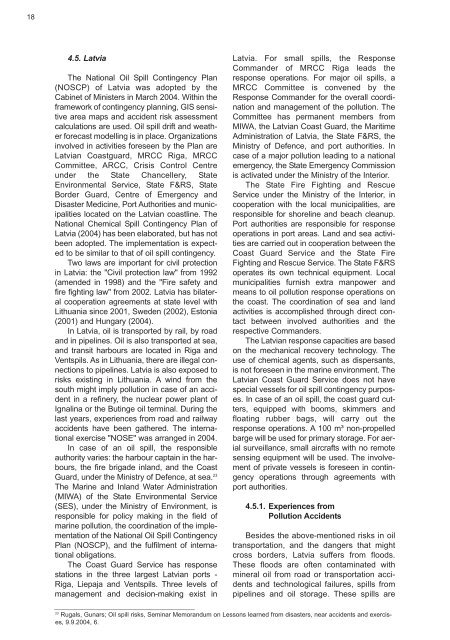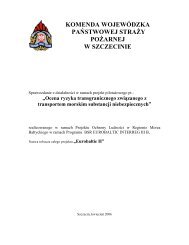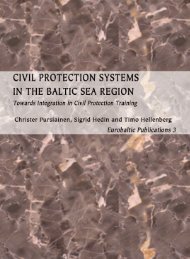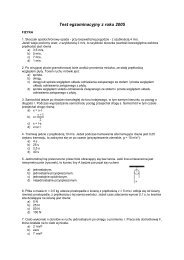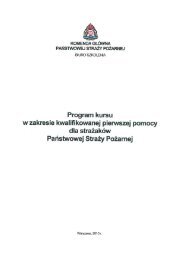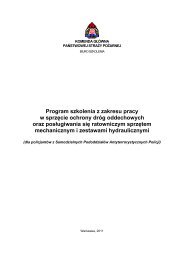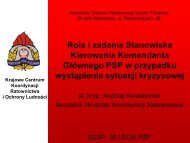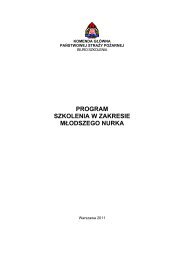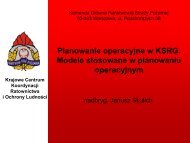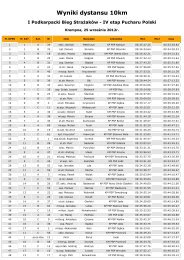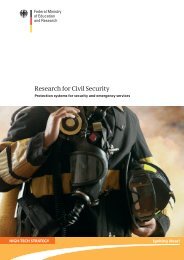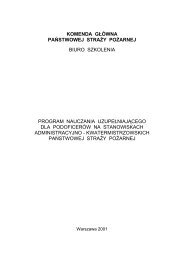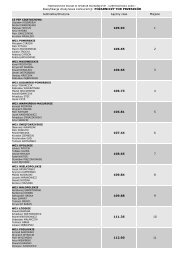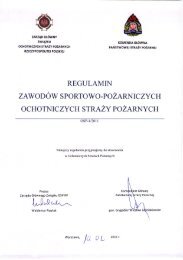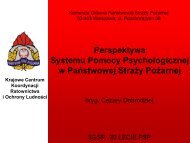Cross-Border Risks in the Baltic Sea Region: Lessons to ... - Helsinki.fi
Cross-Border Risks in the Baltic Sea Region: Lessons to ... - Helsinki.fi
Cross-Border Risks in the Baltic Sea Region: Lessons to ... - Helsinki.fi
You also want an ePaper? Increase the reach of your titles
YUMPU automatically turns print PDFs into web optimized ePapers that Google loves.
18<br />
4.5. Latvia<br />
The National Oil Spill Cont<strong>in</strong>gency Plan<br />
(NOSCP) of Latvia was adopted by <strong>the</strong><br />
Cab<strong>in</strong>et of M<strong>in</strong>isters <strong>in</strong> March 2004. With<strong>in</strong> <strong>the</strong><br />
framework of cont<strong>in</strong>gency plann<strong>in</strong>g, GIS sensitive<br />
area maps and accident risk assessment<br />
calculations are used. Oil spill drift and wea<strong>the</strong>r<br />
forecast modell<strong>in</strong>g is <strong>in</strong> place. Organizations<br />
<strong>in</strong>volved <strong>in</strong> activities foreseen by <strong>the</strong> Plan are<br />
Latvian Coastguard, MRCC Riga, MRCC<br />
Committee, ARCC, Crisis Control Centre<br />
under <strong>the</strong> State Chancellery, State<br />
Environmental Service, State F&RS, State<br />
<strong>Border</strong> Guard, Centre of Emergency and<br />
Disaster Medic<strong>in</strong>e, Port Authorities and municipalities<br />
located on <strong>the</strong> Latvian coastl<strong>in</strong>e. The<br />
National Chemical Spill Cont<strong>in</strong>gency Plan of<br />
Latvia (2004) has been elaborated, but has not<br />
been adopted. The implementation is expected<br />
<strong>to</strong> be similar <strong>to</strong> that of oil spill cont<strong>in</strong>gency.<br />
Two laws are important for civil protection<br />
<strong>in</strong> Latvia: <strong>the</strong> "Civil protection law" from 1992<br />
(amended <strong>in</strong> 1998) and <strong>the</strong> "Fire safety and<br />
<strong>fi</strong>re <strong>fi</strong>ght<strong>in</strong>g law" from 2002. Latvia has bilateral<br />
cooperation agreements at state level with<br />
Lithuania s<strong>in</strong>ce 2001, Sweden (2002), Es<strong>to</strong>nia<br />
(2001) and Hungary (2004).<br />
In Latvia, oil is transported by rail, by road<br />
and <strong>in</strong> pipel<strong>in</strong>es. Oil is also transported at sea,<br />
and transit harbours are located <strong>in</strong> Riga and<br />
Ventspils. As <strong>in</strong> Lithuania, <strong>the</strong>re are illegal connections<br />
<strong>to</strong> pipel<strong>in</strong>es. Latvia is also exposed <strong>to</strong><br />
risks exist<strong>in</strong>g <strong>in</strong> Lithuania. A w<strong>in</strong>d from <strong>the</strong><br />
south might imply pollution <strong>in</strong> case of an accident<br />
<strong>in</strong> a ref<strong>in</strong>ery, <strong>the</strong> nuclear power plant of<br />
Ignal<strong>in</strong>a or <strong>the</strong> But<strong>in</strong>ge oil term<strong>in</strong>al. Dur<strong>in</strong>g <strong>the</strong><br />
last years, experiences from road and railway<br />
accidents have been ga<strong>the</strong>red. The <strong>in</strong>ternational<br />
exercise "NOSE" was arranged <strong>in</strong> 2004.<br />
In case of an oil spill, <strong>the</strong> responsible<br />
authority varies: <strong>the</strong> harbour capta<strong>in</strong> <strong>in</strong> <strong>the</strong> harbours,<br />
<strong>the</strong> <strong>fi</strong>re brigade <strong>in</strong>land, and <strong>the</strong> Coast<br />
Guard, under <strong>the</strong> M<strong>in</strong>istry of Defence, at sea. 23<br />
The Mar<strong>in</strong>e and Inland Water Adm<strong>in</strong>istration<br />
(MIWA) of <strong>the</strong> State Environmental Service<br />
(SES), under <strong>the</strong> M<strong>in</strong>istry of Environment, is<br />
responsible for policy mak<strong>in</strong>g <strong>in</strong> <strong>the</strong> <strong>fi</strong>eld of<br />
mar<strong>in</strong>e pollution, <strong>the</strong> coord<strong>in</strong>ation of <strong>the</strong> implementation<br />
of <strong>the</strong> National Oil Spill Cont<strong>in</strong>gency<br />
Plan (NOSCP), and <strong>the</strong> ful<strong>fi</strong>lment of <strong>in</strong>ternational<br />
obligations.<br />
The Coast Guard Service has response<br />
stations <strong>in</strong> <strong>the</strong> three largest Latvian ports -<br />
Riga, Liepaja and Ventspils. Three levels of<br />
management and decision-mak<strong>in</strong>g exist <strong>in</strong><br />
Latvia. For small spills, <strong>the</strong> Response<br />
Commander of MRCC Riga leads <strong>the</strong><br />
response operations. For major oil spills, a<br />
MRCC Committee is convened by <strong>the</strong><br />
Response Commander for <strong>the</strong> overall coord<strong>in</strong>ation<br />
and management of <strong>the</strong> pollution. The<br />
Committee has permanent members from<br />
MIWA, <strong>the</strong> Latvian Coast Guard, <strong>the</strong> Maritime<br />
Adm<strong>in</strong>istration of Latvia, <strong>the</strong> State F&RS, <strong>the</strong><br />
M<strong>in</strong>istry of Defence, and port authorities. In<br />
case of a major pollution lead<strong>in</strong>g <strong>to</strong> a national<br />
emergency, <strong>the</strong> State Emergency Commission<br />
is activated under <strong>the</strong> M<strong>in</strong>istry of <strong>the</strong> Interior.<br />
The State Fire Fight<strong>in</strong>g and Rescue<br />
Service under <strong>the</strong> M<strong>in</strong>istry of <strong>the</strong> Interior, <strong>in</strong><br />
cooperation with <strong>the</strong> local municipalities, are<br />
responsible for shorel<strong>in</strong>e and beach cleanup.<br />
Port authorities are responsible for response<br />
operations <strong>in</strong> port areas. Land and sea activities<br />
are carried out <strong>in</strong> cooperation between <strong>the</strong><br />
Coast Guard Service and <strong>the</strong> State Fire<br />
Fight<strong>in</strong>g and Rescue Service. The State F&RS<br />
operates its own technical equipment. Local<br />
municipalities furnish extra manpower and<br />
means <strong>to</strong> oil pollution response operations on<br />
<strong>the</strong> coast. The coord<strong>in</strong>ation of sea and land<br />
activities is accomplished through direct contact<br />
between <strong>in</strong>volved authorities and <strong>the</strong><br />
respective Commanders.<br />
The Latvian response capacities are based<br />
on <strong>the</strong> mechanical recovery technology. The<br />
use of chemical agents, such as dispersants,<br />
is not foreseen <strong>in</strong> <strong>the</strong> mar<strong>in</strong>e environment. The<br />
Latvian Coast Guard Service does not have<br />
special vessels for oil spill cont<strong>in</strong>gency purposes.<br />
In case of an oil spill, <strong>the</strong> coast guard cutters,<br />
equipped with booms, skimmers and<br />
float<strong>in</strong>g rubber bags, will carry out <strong>the</strong><br />
response operations. A 100 m³ non-propelled<br />
barge will be used for primary s<strong>to</strong>rage. For aerial<br />
surveillance, small aircrafts with no remote<br />
sens<strong>in</strong>g equipment will be used. The <strong>in</strong>volvement<br />
of private vessels is foreseen <strong>in</strong> cont<strong>in</strong>gency<br />
operations through agreements with<br />
port authorities.<br />
4.5.1. Experiences from<br />
Pollution Accidents<br />
Besides <strong>the</strong> above-mentioned risks <strong>in</strong> oil<br />
transportation, and <strong>the</strong> dangers that might<br />
cross borders, Latvia suffers from floods.<br />
These floods are often contam<strong>in</strong>ated with<br />
m<strong>in</strong>eral oil from road or transportation accidents<br />
and technological failures, spills from<br />
pipel<strong>in</strong>es and oil s<strong>to</strong>rage. These spills are<br />
23<br />
Rugals, Gunars; Oil spill risks, Sem<strong>in</strong>ar Memorandum on <strong>Lessons</strong> learned from disasters, near accidents and exercises,<br />
9.9.2004, 6.


